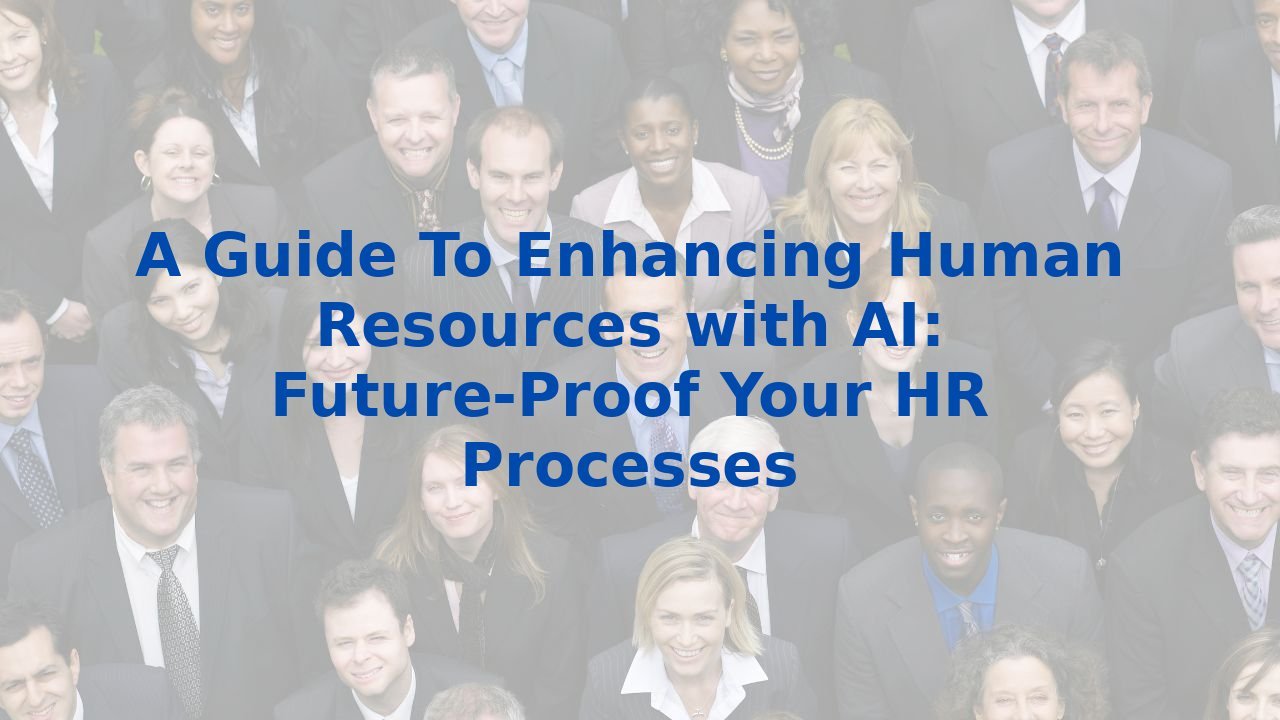A Guide To Enhancing Human Resources with AI: Future-Proof Your HR Processes

A Guide To Enhancing Human Resources with AI: Future-Proof Your HR Processes
In today’s fast-paced business world, the HR landscape is no longer just about hiring and managing personnel. It’s about strategically leveraging technology to drive organizational success. One of the most transformative technologies in this domain is Artificial Intelligence (AI). By integrating AI into HR processes, organizations can not only streamline operations but also position themselves for long-term growth and efficiency. This guide explores how AI can revolutionize various HR functions, driving enhanced productivity and engagement.
The Evolution of HR Processes
Human Resources has grown from simple administrative functions to a strategic powerhouse within organizations. Traditional HR responsibilities, ranging from recruitment to compliance, often involved manual processes that were vulnerable to human error and inefficiency. However, AI introduces a fresh approach—automating time-consuming tasks, allowing HR professionals to focus on what truly matters: people.
Benefits of AI Integration in HR
1. Recruitment and Hiring
AI transforms the recruitment landscape by analyzing massive datasets from resumes, job applications, and even social media. This capability allows HR professionals to swiftly identify the best candidates while minimizing potential biases. With chatbots stepping in for initial candidate screening, hiring teams can allocate their time to engaging with top talent instead of sifting through hundreds of applications. The result? A more efficient and refined hiring process, designed to attract the right fit for the organization.
2. Employee Onboarding
First impressions matter and onboarding is a pivotal process in employee retention. AI streamlines onboarding by offering personalized experiences, complete with tailored welcome messages and step-by-step guides. This technology ensures that new hires have all the information they need to integrate seamlessly into their roles. With customized onboarding plans, organizations not only enhance employee satisfaction but also boost productivity from day one.
3. Performance Management
Performance reviews often come with biases and inaccuracies. AI advances this process by analyzing objective data to highlight employee strengths and pinpoint areas for improvement. Real-time feedback mechanisms powered by AI facilitate continuous dialogue between employees and managers, fostering a culture of engagement and growth. This focus on personalized development plans enriches employee experience and enhances overall productivity.
4. Benefits Administration
Navigating employee benefits can be complex, yet AI makes this task simpler and more efficient. By automating benefits enrollment and offering tailored recommendations, AI minimizes administrative burdens and errors. Furthermore, predictive analytics equip HR teams with insights into potential employee turnover, guiding strategic retention efforts. This proactive approach positions organizations to keep their top talent happy and engaged.
5. Compliance and Risk Management
In an era of changing regulations, compliance is a major concern for HR departments. AI tools can monitor adherence to labor laws and swiftly highlight discrepancies, reducing the risk of legal challenges. By identifying potential risks, organizations can proactively take measures to mitigate them, ultimately ensuring a safer and more compliant workforce.
The Importance of AI Literacy in HR
While appropriating AI in HR can yield enhanced processes and outcomes, understanding its implications is paramount. AI literacy involves grasping both the opportunities AI presents and its limitations. HR professionals need to be equipped with the knowledge of formulating insightful queries and understanding AI outputs. This skill set ensures they can work hand-in-hand with AI, harnessing its capabilities to elevate HR functions.
Training for an AI-Driven Future
To ensure success in the AI landscape, it is vital for organizations to invest in comprehensive training for their HR teams. By fostering a culture of AI literacy, teams are empowered to take full advantage of AI tools while driving engagement and innovation. The commitment to continuous learning and adaptation helps not only individual careers but also fuels the organization’s collective growth.
Conclusion
The incorporation of AI into Human Resources is not just a trend; it's a transformative leap toward operational excellence. By embracing AI technologies, HR departments can streamline recruitment, enhance employee experiences, improve performance management, simplify benefits administration, and ensure compliance—all while fostering a strategic focus on engagement and development. To truly harness these benefits, investing in AI literacy and training is crucial. The HR landscape is evolving, and those ready to navigate this change will lead the way toward sustainable organizational success.
For more insights on AI training solutions and resources tailored for your organization, consider exploring comprehensive programs designed to equip your workforce with essential AI skills. By preparing for the future, you ensure that your HR processes are not only efficient but exemplary in driving organizational growth.